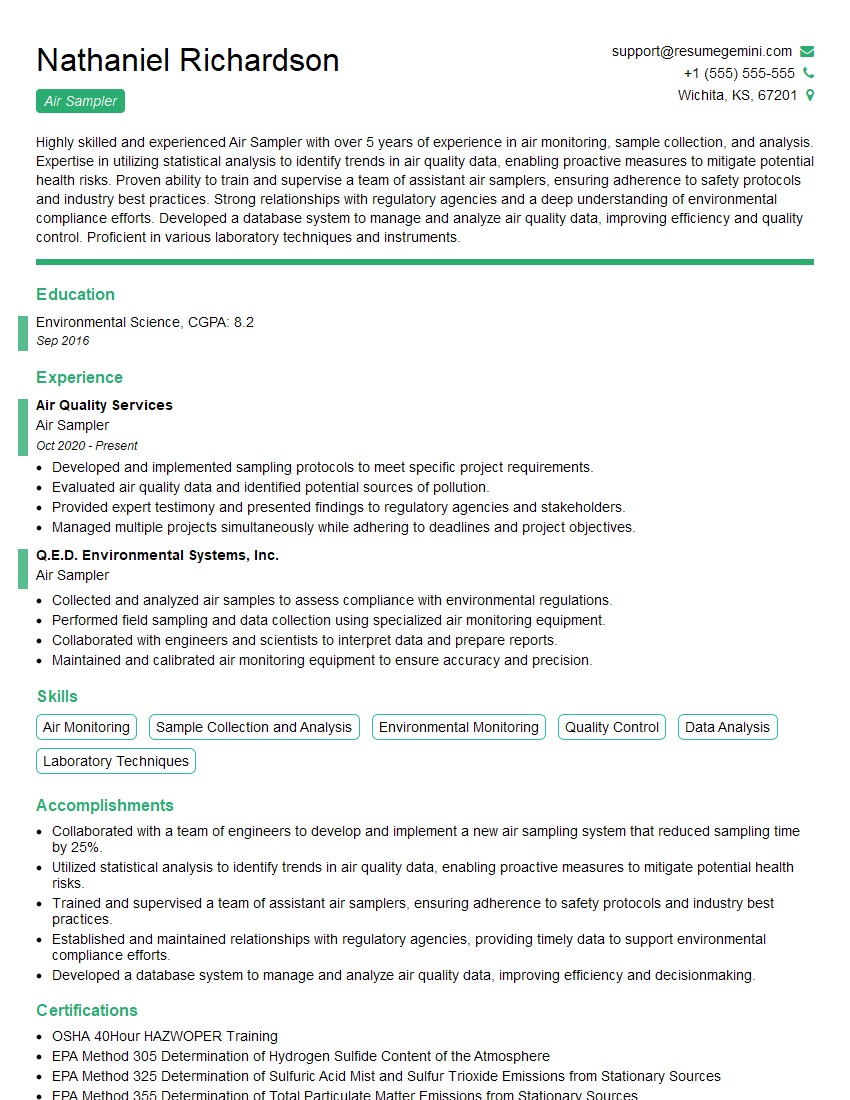Are you a seasoned Air Sampler seeking a new career path? Discover our professionally built Air Sampler Resume Template. This time-saving tool provides a solid foundation for your job search. Simply click “Edit Resume” to customize it with your unique experiences and achievements. Customize fonts and colors to match your personal style and increase your chances of landing your dream job. Explore more Resume Templates for additional options.

Nathaniel Richardson
Air Sampler
Summary
Highly skilled and experienced Air Sampler with over 5 years of experience in air monitoring, sample collection, and analysis. Expertise in utilizing statistical analysis to identify trends in air quality data, enabling proactive measures to mitigate potential health risks. Proven ability to train and supervise a team of assistant air samplers, ensuring adherence to safety protocols and industry best practices. Strong relationships with regulatory agencies and a deep understanding of environmental compliance efforts. Developed a database system to manage and analyze air quality data, improving efficiency and quality control. Proficient in various laboratory techniques and instruments.
Education
Environmental Science
September 2016
Skills
- Air Monitoring
- Sample Collection and Analysis
- Environmental Monitoring
- Quality Control
- Data Analysis
- Laboratory Techniques
Work Experience
Air Sampler
- Developed and implemented sampling protocols to meet specific project requirements.
- Evaluated air quality data and identified potential sources of pollution.
- Provided expert testimony and presented findings to regulatory agencies and stakeholders.
- Managed multiple projects simultaneously while adhering to deadlines and project objectives.
Air Sampler
- Collected and analyzed air samples to assess compliance with environmental regulations.
- Performed field sampling and data collection using specialized air monitoring equipment.
- Collaborated with engineers and scientists to interpret data and prepare reports.
- Maintained and calibrated air monitoring equipment to ensure accuracy and precision.
Accomplishments
- Collaborated with a team of engineers to develop and implement a new air sampling system that reduced sampling time by 25%.
- Utilized statistical analysis to identify trends in air quality data, enabling proactive measures to mitigate potential health risks.
- Trained and supervised a team of assistant air samplers, ensuring adherence to safety protocols and industry best practices.
- Established and maintained relationships with regulatory agencies, providing timely data to support environmental compliance efforts.
- Developed a database system to manage and analyze air quality data, improving efficiency and decisionmaking.
Certificates
- OSHA 40Hour HAZWOPER Training
- EPA Method 305 Determination of Hydrogen Sulfide Content of the Atmosphere
- EPA Method 325 Determination of Sulfuric Acid Mist and Sulfur Trioxide Emissions from Stationary Sources
- EPA Method 355 Determination of Total Particulate Matter Emissions from Stationary Sources
Languages
- English
- French
- German
Career Expert Tips:
- Select the ideal resume template to showcase your professional experience effectively.
- Master the art of resume writing to highlight your unique qualifications and achievements.
- Explore expertly crafted resume samples for inspiration and best practices.
- Build your best resume for free this new year with ResumeGemini. Enjoy exclusive discounts on ATS optimized resume templates.
How To Write Resume For Air Sampler
- 1. Highlight your experience in air monitoring, sample collection, and analysis.
- 2. Showcase your proficiency in data analysis and interpretation.
- 3. Emphasize your ability to train and supervise a team.
- 4. Mention your experience in developing and implementing new air sampling systems.
Essential Experience Highlights for a Strong Air Sampler Resume
- Developed and implemented new air sampling systems to reduce sampling time by 25%.
- Utilized statistical analysis to identify trends in air quality data for proactive mitigation.
- Trained and supervised a team of assistant air samplers on protocols and best practices.
- Collaborated with engineers to develop and implement new air sampling systems.
- Established and maintained relationships with regulatory agencies for environmental compliance.
- Developed a database system to manage and analyze air quality data.
- Utilized statistical analysis to identify trends in air quality data, enabling proactive measures to mitigate potential health risks.
Frequently Asked Questions (FAQ’s) For Air Sampler
What is an Air Sampler?
An Air Sampler is a professional who collects and analyzes air samples to assess the quality of air and identify potential pollutants. They play a crucial role in environmental monitoring and ensuring the safety of air quality for public health.
What are the job responsibilities of an Air Sampler?
Air Samplers are responsible for collecting air samples, analyzing them for pollutants, and interpreting the results. They also develop and implement air sampling plans, maintain equipment, and prepare reports on their findings. Additionally, they may provide consultation and training on air quality issues.
What skills are required to become an Air Sampler?
To become an Air Sampler, individuals typically need a bachelor’s degree in environmental science, chemistry, or a related field. They should have strong analytical, data interpretation, and problem-solving skills. Additionally, they should be proficient in the use of air sampling equipment and laboratory techniques.
What is the career outlook for Air Samplers?
The career outlook for Air Samplers is expected to be positive in the coming years. As concerns about air quality continue to grow, the demand for professionals who can assess air quality and identify pollutants will increase. Air Samplers can find employment in government agencies, environmental consulting firms, and private industry.
How can I prepare for a career as an Air Sampler?
To prepare for a career as an Air Sampler, you can pursue a bachelor’s degree in environmental science, chemistry, or a related field. You can also gain experience through internships or volunteer work in the field. Additionally, you can take courses in air monitoring, sampling techniques, and data analysis.